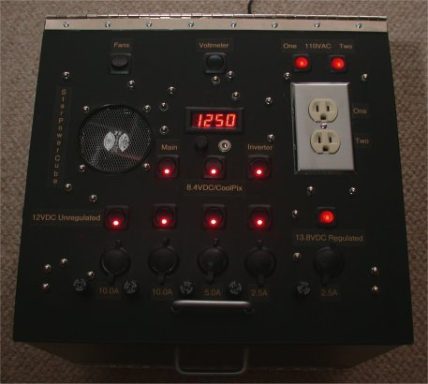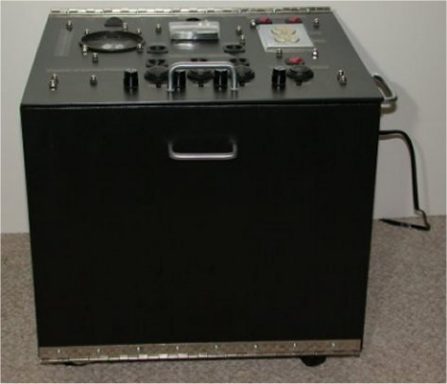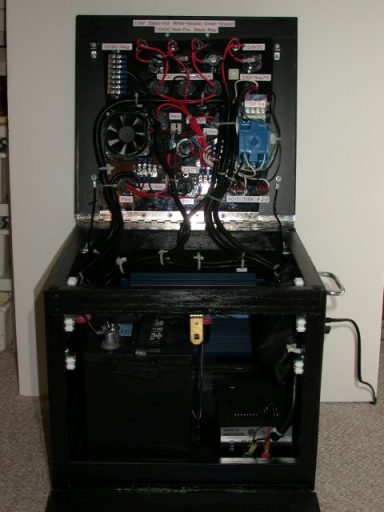StarPowerCube
To fill in some spare time I had and to provide my telescope and its growing compliment of power-hungry accessories with extended clean and reliable power, I recognized that I needed one or more heavy-duty portable power sources. After scouring the Internet for suitable units, I decided to build an all-inclusive mobile power station.
My first attempt was a very decent and workable box, but it did not come close to meeting all my needs. The power supply needed to support concurrent use of the following equipment:
Type of Device Voltage Wattage Amps Notes
UDOO X86 Microcomputer 110 50
USBay USB Hub (3 USB,1P,S1) 110 55
AC-to-DC Regulated Power Supply 110 100
LX200GPS 10" Telescope 13.8 2.5
Portawatzz 600-Watt Inverter 12 6 0.3 No-Load Draw
DewBuster Controller 12 6 0.5 No-Load Draw
Kendrick 10" Heater 12 2 4 2.0
Kendrick Telrad Heater 12 2.3 0.19
AC to DC Regulated Power Supply 12 0.5 No-Load Draw
DC to DC Regulated Power Supply 12 0.5 No-Load Draw
Canon 6D Camera 8 12 1.5
Home-Built Peltier Camera Cooler 3-12 80 8-6
More Details
As you can see there is significant variation in the voltages and current required by the various accessories and devices. What made this task truly daunting was my newbie understanding of electronics. With the help of some really good people (Buck Harley, Todd Brower, and Dr. Clay) I was able to eke out a design that met the above needs and at the same time does not blow myself and my equipment up. So, after many nights at the drafting table (the kitchen table) I came up with this design, The "StarPowerCube". Essentially a 15"x15"x12" cube on casters with pull handles.
The cube is constructed out of Grade A exterior plywood (sides - 3/8", bottom - 1/2") and the top made out of 1/4" Lexan plastic. I chose Lexan (it's clear with a black contact paper layer) because I found the 3/8" ply had a tendency to split when drilled or screwed and panel-mounted components fit better on it. All the plywood is screw attached to 1"x2" interior Oak framing. The Top Panel and the drop-down front panel are attached via piano hinges and kept in place with cabinet latches. The cube's exterior and interior received two coats of prime, two coats of acrylic paint and a quick coat of polyurethane.
Almost all electrical components came from RadioShack with the exception of the 13.8 Regulated Power Supply. The power supply is an Elenco PS-3 unit purchased from Ocean Electronics out of Rhode Island. I replaced the original analog voltage meter with a digital LED meter. This required its own voltage regulator circuit (I can now design and build simple circuit boards and regulator circuits) to provide 5vdc power from the 12vdc battery. I also added a regulated 12V to 8.0V 1.5amp DC Power Supply to drive my Canon 6D Camera for extended periods of time. The cube also has four (4) 12vdc outlet/jack to drive my 12vdc accessories.
All circuits have their own illuminated power switches. All 12vdc and 13.8 vdc circuits have their own in-line fuses with the fuse holders accessible from the top panel. I chose varying amperages for the fuses, ranging from 2.5a, 5a and 10a.
All wiring from the top panel to the main cube section is contained within 1/4" or 1/2" plastic wire loom to prevent abrasion of the insulation. The unit has two cooling fans, an 80mm exhaust fan on the top panel (hope it makes for a good hand-warmer in the dead of winter) and 60mm input fan on the side of the unit.
The unit is powered from a deep-cycle marine battery. It supplies 96Amp Hours of power.
The battery is recharged in either one of two ways. If a truly deep battery discharge has taken place, I will put the unit on a 10Amp Battery Charger and recharge it overnight. Most times I use a BatteryMinder 2012: 12 Volt-2 Amp Battery Charger, Battery Maintainer, and Battery Desulfator with an access port built into the side of the cube to trickle charge and recondition the battery. The black bag you see in one of the pictures holds cables and some spare fuses.
The unit while mobile and portable is not lightweight. It tips the scales at 70lbs. It does fit nicely under my portable roll-up aluminum table. I plan on adding a collapsible luggage carrier type handle to more easily move the unit around.
The project cost more than I thought it would (approximately $350~$400) which was directly related to designing and learning on the fly. All told it took about 60 hours of construction (50% cube construction, sanding, priming and painting) and 50% wiring assembly and testing.
I am quite happy with the outcome. If you have any questions or would like to know more about my unit, please send me email at
©Copyright. All rights reserved.
We need your consent to load the translations
We use a third-party service to translate the website content that may collect data about your activity. Please review the details in the privacy policy and accept the service to view the translations.





